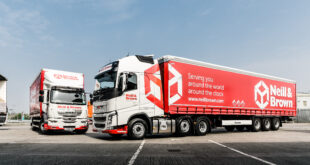The economy is starting to improve and a direct result is a significant change in the CO2 emission. In the fourth quarter of 2014 CO2 emission increased with 1,4%.
The more reason that an important subject remains on the agenda of many transport and logistics companies: Environmental responsibility. In addition, an increasing amount of trading partners want to know how a company is dealing with CO2 emissions.
Despite the fact that the increasing CO2 emission is being pushed by the improving economy it is still important that it remains a focus point. Where the economy increased with 1% over 2014, CO2 emission increased more with 1,4%.
Road traffic continues to be one of the major sources of air pollution in the Netherlands. The emission includes particulates, nitrogen oxides and carbon monoxide, which all contribute to health risks such as lung and respiratory diseases. Everyone is collectively responsible when it comes to reducing these emissions: Consumers, producers and suppliers. To contribute to this, there are many opportunities available for transport companies as well.
Compensation programs
Over the past few years more organizations have emerged that allow CO2 compensation. A positive eco-balance creates a clear competitive advantage and strengthens a company’s brand. To profile this commitment to the outside world these organizations provide certifications.
Companies for example have the possibility to make a small financial contribution to external parties who are committed to preserving nature and reducing CO2. The company compensates the CO2 emissions through this financial support, enabling them to profile the company as CO2 neutral. When a truck travels a distance of 1000 km it emits 0,492 tonnes of CO2, which is equivalent to € 11,00. This amount is used, for example, to plant trees, create biogas or build solar cookers in developing countries, where modernization will lead to more and more energy consumption.
The CO2 emission can be calculated with various calculation modules on the websites of several of these organizations. Another option to determine the CO2 emission is the amount of fuel that is used. After all, this is a number every transport company keeps track off already.
Decreasing the CO2 emission
Eco driving
In addition to the compensation programs the driver’s driving style and the handling of the vehicle are also important when reducing CO2 emissions. ECOWILL, an organization that has carried out research into fuel-efficient driving, set 5 golden rules which should contribute to a reduced fuel consumption.
- Anticipating: Rolling out and accelerating instead of braking directly reduces fuel consumption.
- Correct tire pressure: More friction at low pressure means more resistance and higher fuel consumption.
- Smooth acceleration: At a lower RPM less fuel is consumed.
- Maintaining consistent speed: A consistent speed means less abrupt braking and less acceleration, which only requires fuel.
- Additional energy consumption: Awareness of extra energy that consumes fuel. For example air conditioning and radio.
A reduced fuel consumption does not only decrease CO2 emission, it also creates significant cost savings for the employer. Cost management that does not only decrease CO2 emission but also allows for efficiency and operational excellence.
Alternative fuel
The CO2 emission can also be reduced with adding AdBlue. AdBlue is an aqueous urea solution which is used in the SCR system to reduce nitrogen oxide emissions from heavy diesel vehicles. AdBlue can be refilled the same way as fuel and is available at gas stations. The necessary amount is low: per 100 litres of diesel, about 5 litres of AdBlue will be consumed.
Reducing CO2 emission can in addition to using an alternative fuel be achieved simply by taking a more efficient route. There are several tools that can be used to find the shortest routes to the gas station. These tools, in addition to reducing CO2 emissions, also contribute to cost savings: not only can be chosen for the shortest route, with the help of the price comparison the shortest route to the cheapest gas station can be selected.
Foresight
With the mentioned possibilities reducing CO2 emissions will be attractive to every company. Besides an increasingly competitive advantage and better position within the transportation industry, reducing CO2 emissions will allow for cost management that enables new investments.
To enable efficient working and sufficient energy globally now and in the future, it is important that companies are aware of the opportunities they have to contribute. This awareness starts today!
You Drive, We Care
 DKV BeNeLux You drive, we care
DKV BeNeLux You drive, we care

